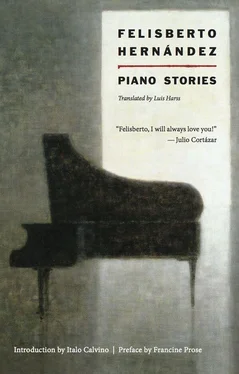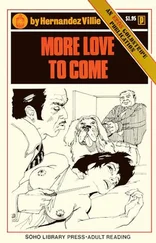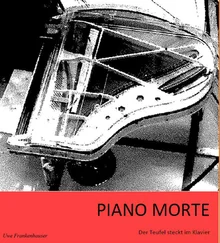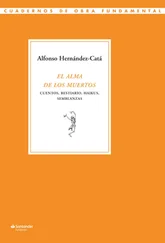Felisberto Hernandez - Piano Stories
Здесь есть возможность читать онлайн «Felisberto Hernandez - Piano Stories» весь текст электронной книги совершенно бесплатно (целиком полную версию без сокращений). В некоторых случаях можно слушать аудио, скачать через торрент в формате fb2 и присутствует краткое содержание. Год выпуска: 2014, Издательство: New Directions, Жанр: Современная проза, на английском языке. Описание произведения, (предисловие) а так же отзывы посетителей доступны на портале библиотеки ЛибКат.
- Название:Piano Stories
- Автор:
- Издательство:New Directions
- Жанр:
- Год:2014
- ISBN:нет данных
- Рейтинг книги:4 / 5. Голосов: 1
-
Избранное:Добавить в избранное
- Отзывы:
-
Ваша оценка:
- 80
- 1
- 2
- 3
- 4
- 5
Piano Stories: краткое содержание, описание и аннотация
Предлагаем к чтению аннотацию, описание, краткое содержание или предисловие (зависит от того, что написал сам автор книги «Piano Stories»). Если вы не нашли необходимую информацию о книге — напишите в комментариях, мы постараемся отыскать её.
Piano Stories
Piano Stories — читать онлайн бесплатно полную книгу (весь текст) целиком
Ниже представлен текст книги, разбитый по страницам. Система сохранения места последней прочитанной страницы, позволяет с удобством читать онлайн бесплатно книгу «Piano Stories», без необходимости каждый раз заново искать на чём Вы остановились. Поставьте закладку, и сможете в любой момент перейти на страницу, на которой закончили чтение.
Интервал:
Закладка:
On his way home, after this adventure with a Daisy belonging to someone else, he thought of moving to some other country and never looking at another doll. He hurried into the black house and up to the bedroom, grimly determined to get rid of Eulalie — and found Mary sprawled face down on the bed, crying. He went up and stroked her hair, but realized Eulalie was on the bed with them. So he called in one of the twins and ordered her to remove the doll and to have Frank come for her. He stretched out next to Mary and they both lay there in silence waiting for night to fall. And then, taking her hand and searching painfully for words, as if struggling with a foreign language, he confessed how disappointed he was in the dolls and how miserable his life had been without her.
IX
Mary thought Horace’s disappointment in the dolls was final, and for a while they both acted as if happier times were back. The first few days, the memories of Daisy were bearable. But then they began to fall into unexpected silences — and each knew who the other was thinking of. One morning, strolling in the garden, Mary stopped by the tree where she had put Daisy to surprise Horace. There, remembering the story made up by the neighbors and the fact that she had actually killed Daisy, she burst into tears. When Horace came out to ask her what was wrong, she met him with a bleak silence, refusing to explain. He realized she had lost much of her appeal, standing there with folded arms, without Daisy. Then, one evening, he was seated in the little parlor, blaming himself for Daisy’s death, brooding over his guilt, when suddenly he noticed a black cat in the room. He got up, annoyed, intending to rebuke Alex for letting it in, when Mary appeared saying she had brought it. She was in such a gay mood, hugging him as she told him about it, that he did not want to upset her by throwing it out, but he hated it for the way it had taken advantage of his guilty feelings to sneak up on him. And soon it became a source of further discord as she trained it to sleep on the bed. He would wait for her to fall asleep, then start an earthquake under the covers until he dislodged it. One night she woke up in the middle of the earthquake:
“Was that you kicking the cat, Horace?”
“I don’t know.”
She kept coming to the defense of the cat, scolding him when he was mean to it. One night, after dinner, he went into the show room to play the piano. For some days now he had called off the scenes in the glass cases and, against his habit, left the dolls in the dark, alone with only the drone of the machines. He lit a footlamp by the piano, and there, on the lid, indistinguishable from the piano except for its eyes, was the cat. Startled, he brushed it off roughly and chased it into the little parlor. There, jumping and clawing to get out, it ripped a curtain off the door to the courtyard. Mary was watching from the dining room. She saw the curtain come down and rushed in with strong words. The last he heard was:
“You made me stab Daisy and now I suppose you want me to kill the cat.”
He put on his hat and went out for a walk. He was thinking that, if she had forgiven him — at one point, when they were making up, she had even said, “I love you because you’re a bit mad” — Mary had no right now to blame him for Daisy’s death. In any case, seeing her lose her attraction without Daisy was punishment enough. The cat, instead of adding to her appeal, cheapened her. She had been crying when he left and he had thought, “Well, it’s her cat — so it’s her guilt.” At the same time, he had the uneasy feeling that her guilt was nothing compared to his, and that, while it was true that she no longer inspired him, it was also true that he was falling back into his old habit of letting her wash his sins away. And so it would always be, even on his deathbed. He imagined her at his side still, on his predictably cowardly last days or minutes, sharing his unholy dread. Perhaps, worse still — he hadn’t made up his mind on that point — he would not know she was there.
At the corner he stopped to gather his wits so he could cross without being run over. For a long time he wandered in the dark streets, lost in thought. Suddenly he found himself in Acacia Park. He sat on a bench, still thinking about his life, resting his eyes on a spot under the trees. Then he followed the long shadows of the trees down to a lake, where he stopped to wonder vaguely about his soul, which was like a gloomy silence over the dark water: a silence with a memory of its own, in which he recognized the noise of the machines, as if it were another form of silence. Perhaps the noise had been a steamboat sailing by, and the silence was the memories of dolls left in the wreck as it sank in the night. Suddenly coming back to reality, he saw a young couple get up out of the shadows. As they approached, he remembered kissing Mary for the first time in a fig tree, nearly falling out of the tree, after picking the first figs. The couple walked by a few feet away, crossed a narrow street and went into a small house. He noticed a row of similar houses, some with “for rent” signs. When he got home, he made up again with Mary. But, later that night, alone for a moment in the show room, he thought of renting one of the small houses on the park with a Daisy Doll.
The next day at breakfast something about the cat caught his attention: it had green bows in its ears. Mary explained that all newborn kittens had the tips of their ears pierced by the druggist with one of those machines used for punching holes in file paper. He found this amusing and decided it was a good sign. From a street phone he called Frank to ask him how he could distinguish the Daisy Dolls from the others in the Springwear collection. Frank said that at the moment there was only one, near the cash register, wearing a single long earring. The fact that there was only one left seemed providential to Horace: she was meant for him. And he began to relish the idea of returning to his vice as to a voluptuous fate. He could have taken a trolley, but he did not want to break his mood, so he walked, thinking about how he was going to tell his doll apart in the throng of other dolls. Now he was also part of a throng, pleasantly lost — it was the day before Carnival — in the holiday crowd. The store was farther away than he had anticipated. He began to feel tired — and anxious to meet the doll. A child aimed a horn at him and let out an awful blast in his face. He started to have horrible misgivings and wondered whether he should not put things off until afternoon. But when he reached the store and saw costumed dolls in the show windows he decided to go in. The Daisy Doll was wearing a wine-colored Renaissance costume. A tiny mask added to her proud bearing and he felt like humbling her. But a salesgirl he knew came up with a crooked smile and he withdrew.
In a matter of days he had installed the doll in one of the small houses by the park. Twice a week, at nine in the evening, Frank sent a girl from his shop over with a cleaning woman. At ten o’clock the girl filled the doll with hot water and left. Horace had kept the doll’s mask on. He was delighted with her and called her Hermione. One night when they were sitting in front of a picture he saw her eyes reflected in the glass: they shone through the black mask and looked thoughtful. From then on he always sat in the same place, cheek to cheek with her, and whenever he thought the eyes in the glass — it was a picture of a waterfall — took on an expression of humbled pride he kissed her passionately. Some nights he crossed the park with her — he seemed to be walking a ghost — and they sat on a bench near a fountain. But suddenly he would realize her water was getting cold and hurry her back into the house.
Not long after that there was a big fashion show in the Springwear store. A huge glass case filled the whole of the top floor: it was in the center of the room, leaving just enough space on all four sides for the spectators to move around it. Because people came not only for the fashions but also to pick out the Daisy Dolls, the show was a tremendous success. The showcase was divided into two sections by a mirror that extended to the ceiling. In the section facing the entrance, the scene — arranged and interpreted by Horace’s boys — represented an old folk tale, “The Woman of the Lake.” A young woman lived in the depths of a forest, near a lake. Every morning she left her tent and went down to the lake to comb her hair. She had a mirror which some said she held up behind her, facing the water, in order to see the back of her head. One morning, after a late party, some high-society ladies decided to pay the lonely woman a visit. They were to arrive at dawn, ask her why she lived alone, and offer their help. When they came up on her, the woman of the lake was combing. She saw their elegant gowns through her hair, and curtsied humbly before them. But at their first question she straightened up and set out along the edge of the lake. The ladies, thinking she was going to answer the question or show them some secret, followed her. But the lonely woman only went round and round the lake, trailed by the ladies, without saying or showing them anything. So the ladies left in disgust, and from then on she was known as “the madwoman of the lake.” Which is why, in that part of the country, a person lost in silent thought is said to be “going round the lake.”
Читать дальшеИнтервал:
Закладка:
Похожие книги на «Piano Stories»
Представляем Вашему вниманию похожие книги на «Piano Stories» списком для выбора. Мы отобрали схожую по названию и смыслу литературу в надежде предоставить читателям больше вариантов отыскать новые, интересные, ещё непрочитанные произведения.
Обсуждение, отзывы о книге «Piano Stories» и просто собственные мнения читателей. Оставьте ваши комментарии, напишите, что Вы думаете о произведении, его смысле или главных героях. Укажите что конкретно понравилось, а что нет, и почему Вы так считаете.












